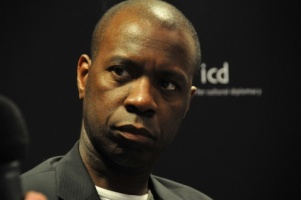Difference between revisions of "Clive Myrie"
| (One intermediate revision by the same user not shown) | |||
| Line 1: | Line 1: | ||
| − | Comment on Cultural Diplomacy | + | Comment on [[Cultural Diplomacy]] |
By Clive Myrie (Journalist, BBC) | By Clive Myrie (Journalist, BBC) | ||
[[File:Myrie.jpg|400x200px|thumbnail|left]] | [[File:Myrie.jpg|400x200px|thumbnail|left]] | ||
| − | "There was no applause, just stunned silence." The words of Jonathan Powell the Chief of Staff to Tony Blair when the British Prime Minister, the leader of the Republic of Ireland and representatives of the Catholic and Protestant communities in Northern Ireland hammered out the Good Friday Agreement. The deal paved the way for peace in the province after decades of conflict that cost many lives. What was apparent to all the negotiators was that once they began talking, they realised they had so much in common; that the other side didn't represent the devil, that the leaders simply wanted the best for their communities based on individual liberty, [[Human Rights|human rights]] and equality. Exactly the same feelings flowered during the initial talks between Nelson Mandela, while he was still on Robben Island, the ANC and representatives of the [[apartheid]] regime in the late 1980s. White negotiators talk of being surprised at how reasonable the black negotiators were, how they were proud, and funny and humble, and determined and conciliatory. In short, how they displayed all the traits of human beings! | + | "There was no applause, just stunned silence." The words of Jonathan Powell the Chief of Staff to Tony Blair when the British Prime Minister, the leader of the Republic of Ireland and representatives of the Catholic and Protestant communities in Northern Ireland hammered out the Good Friday Agreement. The deal paved the way for peace in the province after decades of conflict that cost many lives. What was apparent to all the negotiators was that once they began talking, they realised they had so much in common; that the other side didn't represent the devil, that the leaders simply wanted the best for their communities based on individual liberty, [[Human Rights|human rights]] and equality. Exactly the same feelings flowered during the initial talks between [[Mandela, Nelson|Nelson Mandela]], while he was still on Robben Island, the ANC and representatives of the [[apartheid]] regime in the late 1980s. White negotiators talk of being surprised at how reasonable the black negotiators were, how they were proud, and funny and humble, and determined and conciliatory. In short, how they displayed all the traits of human beings! |
As a war correspondent I've seen far too many times what happens when protagonists lose sight of their own humanity and that of their enemies; when the talking stops and the firing begins. Not just in Northern Ireland or South Africa, but also in Angola, Liberia, Bosnia, Croatia, East Timor, Borneo, Afghanistan, Iraq, Israel, Lebanon and Georgia; a roll call of misery. Different cultures and peoples all focusing on the few things that divide them, rather than the many things that unite them. | As a war correspondent I've seen far too many times what happens when protagonists lose sight of their own humanity and that of their enemies; when the talking stops and the firing begins. Not just in Northern Ireland or South Africa, but also in Angola, Liberia, Bosnia, Croatia, East Timor, Borneo, Afghanistan, Iraq, Israel, Lebanon and Georgia; a roll call of misery. Different cultures and peoples all focusing on the few things that divide them, rather than the many things that unite them. | ||
Latest revision as of 14:38, 1 April 2014
Comment on Cultural Diplomacy By Clive Myrie (Journalist, BBC)
"There was no applause, just stunned silence." The words of Jonathan Powell the Chief of Staff to Tony Blair when the British Prime Minister, the leader of the Republic of Ireland and representatives of the Catholic and Protestant communities in Northern Ireland hammered out the Good Friday Agreement. The deal paved the way for peace in the province after decades of conflict that cost many lives. What was apparent to all the negotiators was that once they began talking, they realised they had so much in common; that the other side didn't represent the devil, that the leaders simply wanted the best for their communities based on individual liberty, human rights and equality. Exactly the same feelings flowered during the initial talks between Nelson Mandela, while he was still on Robben Island, the ANC and representatives of the apartheid regime in the late 1980s. White negotiators talk of being surprised at how reasonable the black negotiators were, how they were proud, and funny and humble, and determined and conciliatory. In short, how they displayed all the traits of human beings!
As a war correspondent I've seen far too many times what happens when protagonists lose sight of their own humanity and that of their enemies; when the talking stops and the firing begins. Not just in Northern Ireland or South Africa, but also in Angola, Liberia, Bosnia, Croatia, East Timor, Borneo, Afghanistan, Iraq, Israel, Lebanon and Georgia; a roll call of misery. Different cultures and peoples all focusing on the few things that divide them, rather than the many things that unite them.
Cultural diplomacy can bridge that gap not just to help resolve conflicts, but crucially to stop them beginning in the first place. Whether it's at Governmental or ambassadorial level, or simply a school sending pupils abroad to learn about other peoples and other ways of doing things. Cultural diplomacy means dialogue, and not just talking, but listening. Appreciating the good in others and the humanity of us all.
